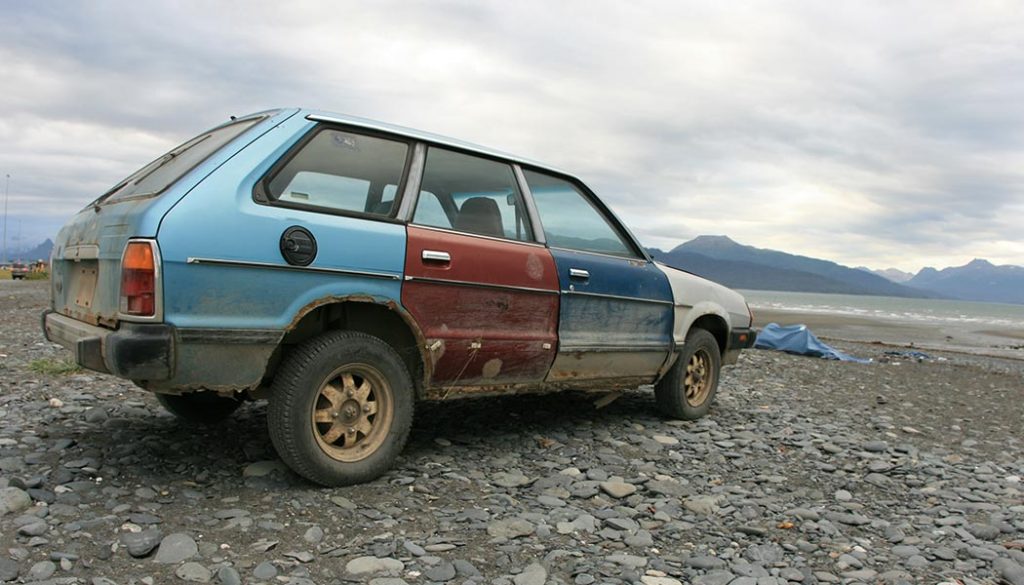

A car is one of the biggest expenses you take on in your life, which is why decisions around getting rid of or buying one can be so stressful.
Some people wrongfully call cars an investment, but unless you’re the proud owner of a 1962 Ferrari Testa Rossa, your vehicle likely isn’t increasing in value over time. That’s not to say that your car is worthless, either, because it definitely provides a value. This is exactly what makes deciding if you should fix or ditch an old clunker difficult – it’s not usually a clear-cut issue.
Muddying up the waters further is the fact that you’ve probably owned your clunker for a long time. Maybe you bought it brand new off the lot, it was a gift from a loved one or you purchased it when the odometer only read 30,000 miles. Owning a vehicle for a long time creates a bond; you begin to understand each other on a level nobody else can comprehend. Every quirky detail is familiar to you, such as the subtle angle you need to actuate the left turn signal so it actually blinks or how to get the rear passenger-side door to latch all the way. The very thought of selling your vehicle might fill you with pain, until it breaks down again and you’re filled with rage instead.
Maybe you’ve had it with your clunker and went to the local car dealership, test drove something nice, sat down and got hit with sticker shock. Taking on that kind of financial responsibility is enough to make anyone reconsider. Staring at a high monthly payment might have you thinking that hooking your clunker up to a trickle charger each night isn’t so bad.
There are several points you should consider before making the final call to either fix or ditch your clunker car. In the end, there’s no right or wrong decision, but you need to be comfortable with whichever one you choose.
One school of thought that many follow is that you should repair your old car, until the cost of repairs exceeds the value of the vehicle itself. You can use a blue book value from Kelley or NADA to figure this out, and doing it is free online. If your vehicle turns out to be worth $1,500 and fixing it will cost $2,000 that’s when you would start shopping for a new car.
At the same time, this way of thinking neglects a big factor that should influence your final decision: opportunity cost. It’s not just about what your clunker is worth on the open market were you to sell it, but also what it would cost to replace it with a newer option. Keep in mind that with a new car you have a monthly payment that won’t go away for years. You also might have to put some cash down to buy the new car, which could make it a more expensive option than just fixing your old vehicle. If financing a new car would put you into financial hardship, more than the cost of the repairs you’ve been making, buying the newer car is just plain a bad idea.
Related Search Topics (Ads)
To keep the costs down, you could consider purchasing a used vehicle. Just keep in mind that more affordable options might come with some surprising hidden costs. In other words, there’s probably a good reason why the budget-friendly option you’re looking at has a lower price than the repairs you need to make on your current vehicle. Once you buy it, you might be dealing with a string of repairs, forcing you to go from the frying pan and into the fire.
Another factor most people neglect is the cost of insurance and registration. With a newer car, you will be paying more for both, which can make the newer car that much less budget-friendly. You can contact your insurance agent to find out how much different vehicles would cost, plus check with your local government on registration expenses.
Sometimes, making certain repairs on a clunker is more like keeping the car on life support. If doing the work on your vehicle will extend its life only a little bit longer, or it’s just delaying a much bigger fix, then it might not be worth sinking the money into it. This is when you should seriously consider cutting your losses and moving on.
There’s also the worry factor. You are always wondering if the car will strand you in one place or another, forcing you to either fix it on the side of the road or call for help. While that might not sound too bad, keep in mind that the vehicle could break down in the middle of nowhere or somewhere that isn’t very safe, making life interesting.
Of course, your clunker could be headed toward some major repairs, like a new transmission or engine. Usually, such extensive jobs are so costly that it’s pretty much a no-brainer to ditch your vehicle and find a new option.
For some people, their car is more than just a way of getting around, or even something they use to have fun on the weekends. The vehicle has become a member of their family, a machine they cannot bear to part with. With such a high amount of sentimental value, even sinking thousands of dollars into the thing is more like a necessary step to keep a friend alive, rather than a bill to be paid.
Everyone’s situation is different, so there’s no blanket method for deciding if you should keep or ditch your clunker.
Related Search Topics (Ads)